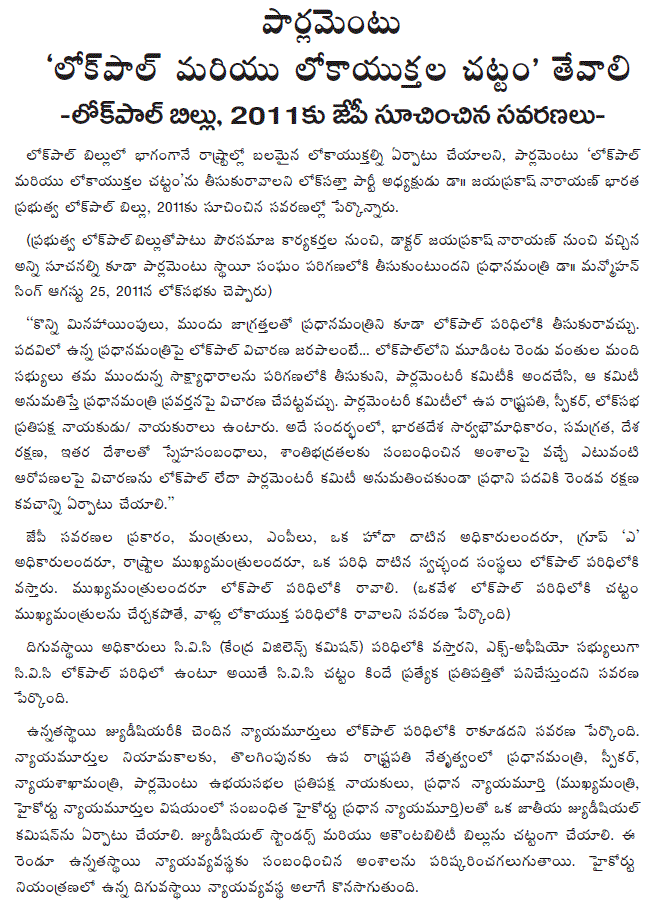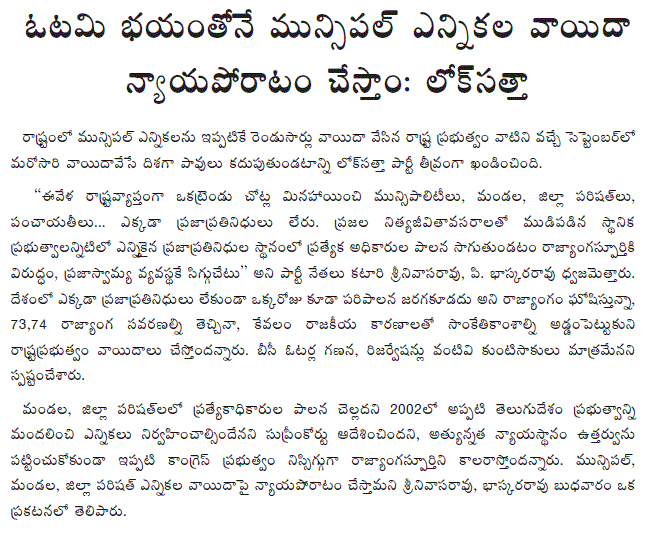Press Releases Archive
We have made history but miles to go: Dr. JP
Lok Satta Party President Dr. Jayaprakash Narayan described August 27 as a great day in the history of our Republic. “Parliament displayed the majesty of the functioning of democracy and members, exemplary unity of purpose and leadership. The quality of debate over the Lokpal and Anna Hazare’s fast is a matter of pride for all Indias, irrespective of their political beliefs.”
Dr. JP said that despite baffling diversity and many failings of our political system, the parliamentarians exhibited true nobility of politics.
“The two cardinal gifts of our Constitution are liberty and the vote through which we govern ourselves. If the elected, Government and Parliament become too strong and undermine liberty, it leads to tyranny. If people’s liberty undermines Parliament, it leads to anarchy. It is a challenge for leaders and people to traverse a middle path, integrating liberty with constitutionalism. “
Dr. JP said Anna Hazare has done yeoman service to the country by bringing the fight against corruption to the center-stage of our political process. Even more important, he has brought large sections of the middle class and youth into the political process.
“Now we have the important task of channeling this energy for long-term political engagement. We have many tasks on hand. We have to end corruption. We have to decentralize Government and empower people. We have to establish the rule of law which treats every one alike. We have to strengthen agriculture and save the farmer. We have to transform the nature of politics and make the best and brightest electable.
“We are all one. There are no distinctions of parties or civil society, Parliament or people. Let us all rejoice and get on with the many tasks on hand. Let us all work with redoubled vigor to complete the unfinished agenda.”
Dr. JP envisages PM under Lokpal Subject to certain conditions
The amendments to the Union Government’s Lokpal Bill suggested by Lok Satta Party President Dr. Jayaprakash Narayan envisage Lokpal’s jurisdiction over the Prime Minister subject to certain caveats and creation of strong Lokayuktas in States as part of the Lokpal Bill.
(Prime Minister Dr. Manmohan Singh told the Lok Sabha on August 25, 2011 that the Parliamentary Standing Committee would consider all the suggestions that emanated from civil society activists and Dr. JP, besides the Government’s Lokpal Bill.)
“The Lokpal may enquire into allegations against a serving Prime Minister, if two-thirds of its members make a reference on the basis of material before them to a Parliamentary Committee comprising the Vice President, Speaker and the Leader of Opposition of the Lok Sabha; and if such a committee sanctions an enquiry into the conduct of the Prime Minister. Then the Lokpal will proceed to enquire into the allegations against the Prime Minister. In such a case, the second safeguard should be that no allegation against the Prime Minister on a matter relating to the sovereignty and integrity of India, the security of the State, friendly relations with foreign States and public order shall be entertained by the Lokpal or the Parliamentary Committee.”
According to Dr. JP’s amendments, the Lokpal will have jurisdiction over all Ministers, MPs, all officials above a certain rank and all Group A officers, all Chief Ministers, and all NGOs above a certain threshold. Chief Ministers should be under the Lokpal. (If the Lokpal law does not include Chief Ministers, they should be under Lokayukta jurisdiction, according to the amendment.)
The amendment says that lower officials shall be covered by the CVC, which will be part of the Lokpal as ex-officio members, but will have separate existence and functions under the CVC Act.
The amendment says that judges of higher judiciary shall not to be under Lokpal jurisdiction. A National Judicial Commission headed by the Vice President, and with Prime Minister, Speaker, Law Minister, Leaders of Opposition in both Houses, and Chief Justice (Chief Minister and Chief Justice of the concerned High Court in case of High Court judges) should be constituted for judicial appointments and oversight; and the Judicial Standards and Accountability Bill should be enacted into law. Both together will address issues relating to higher judiciary. The Subordinate Judiciary, under the control of the High Court, should remain so.
Dr. JP says that the 9-member Lokpal selection committee as proposed in the Bill is reasonable with one modification: The jurist and eminent citizen should be nominated by the rest of the seven members – not the Union Government.
The amendments suggest that the CVC (Chairman + 2 members) should be ex-officio members of the Lokpal, and appointed in the same manner as the Lokpal. The CVC will perform all functions as envisaged under law, except that the allegations against Group A officers and above will be referred to the Lokpal.
Once the CVC is integrated with the Lokpal, but functions under both the Lokpal Act and the CVC Act, that body will exercise superintendence and guidance of the CBI. The CBI should be divided into two agencies – the normal crime investigation wing, and the anti-corruption wing. The anti-corruption CBI will be accountable only to the CVC and not to the Government
Dr. JP suggests that a chapter be incorporated in the Lokpal Bill dealing with Lokayuktas and Local Ombudsmen, and the law should be called The Lokpal and Lokayuktas Act, 2011. With the ratification of the UN Convention against Corruption, Parliament, under Article 253 of the Constitution, has the power to make laws for the entire territory of India even on State subjects in matters relating to corruption. This power should be exercised.
The State ACBs should be brought under the superintendence and guidance of Lokayuktas. The Lokayukta will supervise vigilance machinery in the State.
A separate Grievance Redressal Authority should be created at the national level and in each State as recommended by the Second Administrative Reforms Commission.
Dr. JP suggests that Prevention of Corruption Act & other laws be amended to enlarge the definition of corruption, increase the quantum of punishment in cases of collusive bribery, provide for confiscation of properties of corrupt public servants, and give prosecution powers to the CVC and Lokayuktas.
The Lokpal and Lokayuktas should have powers to appoint all prosecutors and supervise them in all matters relating to all anti-corruption cases, and not merely those investigated by them.
The Lokpal Bill should provide for dismissal, removal or reduction in the rank of officials on the basis of the enquiry of the Lokpal/Lokayukta. Further enquiry should not be made a requirement once the Lokpal/Lokayukta concludes after enquiry that the conduct of a public servant deserves major punishment.




